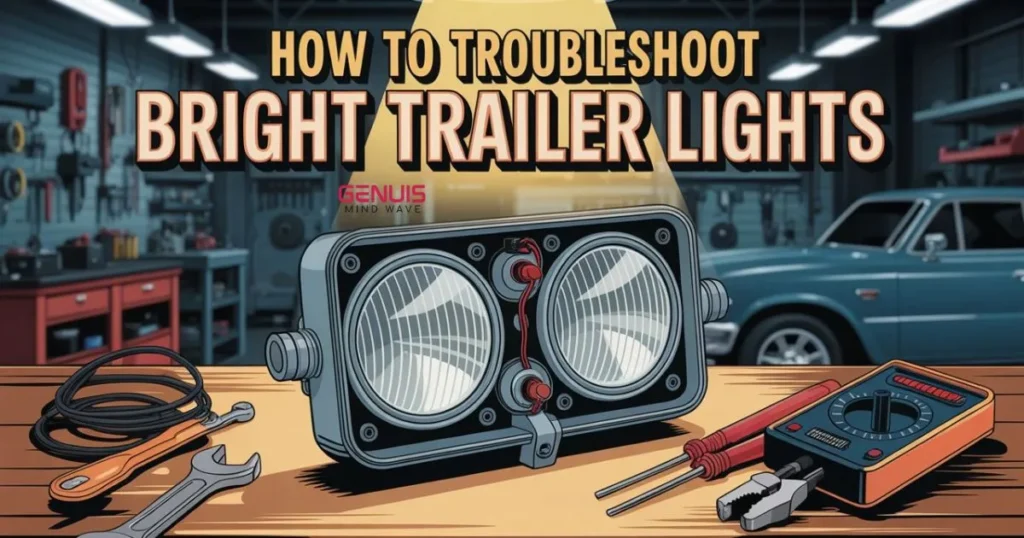How to Troubleshoot Smart Trailer Lights. When your bright trailer lights stop working, it’s not just annoying—it’s dangerous. That’s why learning how to troubleshoot bright trailer lights is essential for safety. Whether you’re dealing with a taillight failure, inconsistent trailer light function, or a poor vehicle-to-trailer connection, it’s crucial to resolve the issue before your next haul.
In this article, we’ll walk you through everything you need to know, step by step. You’ll learn how to diagnose common problems, replace faulty components, and avoid issues like false grounding that can disrupt performance. With the proper knowledge, you’ll be able to tackle lighting problems confidently and keep your trailer road-ready at all times.
What Are Smart Trailer Lights?
Bright trailer lights are modern lighting systems that connect to your vehicle-to-trailer connection and communicate with your tow vehicle’s onboard system. They often include self-check features and send signals if something goes wrong. Unlike regular lights, they are more reliable, brighter, and use less energy.
However, even with these advanced features, knowing how to troubleshoot smart trailer lights is essential. These lights still require trailer grounding location checks, testing for a four-prong plug or a seven-way plug, and verifying the integrity of solid trailer light wiring. If even one part is off, it can cause intermittent trailer light operation or malfunctioning turn signal problems.
What Are the Advantages of Smart Trailer Lights?
Bright trailer lights bring significant benefits. They use LEDs, which last longer than old bulbs. They shine more brightly, making it easier for other drivers to see you. You also get alerts when there are turn signal issues or brake light malfunctions.
They are easier to pair with your trailer harness and reduce power draw from your trailer’s electrical system. These lights facilitate quick testing of trailer signal output, and they can be more responsive in emergencies, thereby increasing safety.
Why Do These Lights Go Bad?
Even the best lights can fail. Ground wire corrosion, pinched or damaged wires, and debris or corrosion on connectors are common reasons why bright trailer lights quit working. Dirt accumulation, water exposure, and normal wear and tear can all cause damage.
Occasionally, the issue lies in the trailer harness or electrical connector eyelet. If your reverse lights malfunction or your lights stay on even when the ignition is off, that points to a continual trailer light function or a short in the wiring.
How to Protect Them
Protect your lights by checking them regularly. Before every trip, inspect your vehicle-to-trailer connection, clean connectors using a wire brush, and test the signal output. This process helps prevent bigger problems later.
Cover exposed wires and protect them from rubbing. Avoid letting your trailer sit in wet or salty conditions for too long. Use grease on your electrical connector eyelet to prevent debris or corrosion from affecting connectors.
Common Causes of Trailer Light Failure
When trailer lights are not working, the problem could be one of many. It may seem tricky, but most issues come from a short list of common causes. Here are the most likely reasons your lights are acting up:
| Problem | Common Signs | Fix |
| Ground wire corrosion | Flickering lights or no lights | Clean the connection and tighten the bolt |
| Blown fuse symptoms | No power to any lights | Check the tow vehicle’s fuse box |
| Worn trailer bulbs | One light is not working | Replace bulb |
| Broken or pinched wires | Intermittent lights | Trace and repair, or replace wires |
| Faulty trailer wiring | The wrong lights activate | Inspect and reroute wires correctly |
Disconnected or Corroded Ground Wires
Ground wire troubleshooting should always be your first step. Ground wires allow electricity to return to its source. Without a solid foundation, the entire system may fail. Signs include flickering trailer lights or all lights shutting off.
Look for rust or looseness around bolts. Remove the bolt and clean the contact area using a wire brush. Smooth and firm ground is crucial for any DIY trailer light repair.
Blown Fuse
A blown fuse in your tow vehicle is a quick fix, but easy to miss. If you lose all lights at once, check the fuse in your tow vehicle. If the fuse is functioning correctly, the issue may be a broken or pinched wire or a short circuit.
Knowing the signs of blown fuse symptoms, such as complete light failure or sparking sounds, can help you act quickly. Always carry extra fuses for a quick fuse replacement.
Worn or Burned-Out Bulbs
Even with LED setups, some trailers still use older bulbs. Tail light failure or one side not working may mean you need a new bulb. Burned bulbs are easy to spot by their dark glass or broken filament.
If you notice only your left light works, the cause isn’t always a wiring issue. Try a new bulb first. Always match the new bulb to the old one for correct trailer light performance.
Chafed or Damaged Wires
Wires run under and around the trailer, where they can rub or get cut. These broken or pinched wires cause intermittent trailer light operation or total light loss.
Look near hinges, corners, or metal edges. Any bare wire is a risk. Wrap or replace damaged wires completely. This procedure also helps prevent false readings in your trailer’s electrical system.
Step-by-Step Trailer Light Troubleshooting Guide
1. Check the Ground Connection
Start with the ground. Remove the electrical connector eyelet or ground bolt and clean it. Tighten it back. This step resolves more problems than you’d expect.
2. Inspect the Trailer Connection
Unplug the four-prong plug or seven-pin connector. Clean both ends using a wire brush. Look for bent pins or corrosion. Reconnect firmly.
3. Test the Tow Vehicle Wiring
Use a tester to check each pin. No light? The problem is with the tow vehicle. Replace the fuse or repair the wiring. This phase is where testing the trailer signal output becomes vital.
4. Check the Bulbs (if Not LED)
Unscrew the light housing. Please take out the bulb and inspect it. If dark or broken, replace it. Be sure it fits properly. This often fixes taillight failure.
5. Examine for Chafed or Pinched Wires
Run your hands along each wire. Feel for cracks, cuts, or sharp bends. Replace any damaged parts. Fixing these can stop trailer light performance decline.
6. Use a Multimeter
Set your multimeter to DC voltage. Test each wire and light. Use this method to confirm signal output testing and voltage levels. It’s the best way to find hidden faults.
7. Be Thorough
Don’t stop after fixing one light: test brakes, signals, and reverse lights. Many issues remain undetected until all components are tested. This step is essential for safe trailer light installation.
8. Prevent False Grounds
Unhook the safety chains, ball hitch, and cables before testing. Leaving them attached causes false ground prevention problems.
9. Consider Lamp-Out Sensors (For Modern Vehicles)
Some new trucks have sensors that cut power if a bulb blows or the wiring isn’t perfect. These can cause continual trailer light functions or errors. Use a resistor or consult your truck manual.
10. Consult Futura or Manufacturer Resources
Companies like Futura offer specific guides. Some trailers utilise composite trailer materials or foldable trailer lights, which require special handling. Check manuals for help.
Tips for Properly Hooking Up Trailer Lights
To prevent problems later, always use a proper trailer hookup method. Clean each connector with a wire brush, apply protective grease, and ensure that the wires are tightly fastened.
Before towing, double-check all lights while someone stands behind the trailer. Look for any reverse light malfunction, turn signal issues, or flickering. Fix them now before they grow worse.
Trust Big Tex Trailer World With Your Troubleshoot Smart Trailer Lights Needs
If you’re tired of electrical connection issues, malfunctioning turn signals, or random flickering, it’s time to call the pros. Big Tex Trailer World provides professional trailer repair services, parts, and expert assistance nationwide.
Our techs specialise in fixing harness connection failures, trailer grounding location issues, and worn trailer bulbs. If you can’t do that, trust Big Tex for a trailer safety light.
Conclusion
Learning how to troubleshoot smart trailer lights like a pro saves time, money, and stress. With the right tools and knowledge, even a beginner can perform DIY trailer light repairs. Remember, smart trailer lights need just as much care as traditional ones.
If you follow these steps and avoid common mistakes, your lights will function flawlessly. If you’re unable to do that, please consider relying on Big Tex for a trailer safety light. You can count on every mile.



